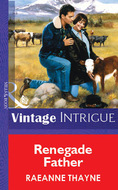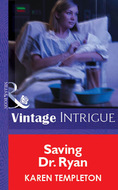Raamatut ei saa failina alla laadida, kuid seda saab lugeda meie rakenduses või veebis.
Loe raamatut: «Secret Agent Sam»
Sam. Can’t be. Can’t be can’t be.
In all the world, he told himself, there had to be more than one female pilot named Sam. Had to be.
A coincidence. A little quirk of fate.
Out on the shimmering runway, the pilot straightened and moved out of the wing’s shadow. Her movements were unhurried…lazy, even. She stood waiting for them to approach, hands clasped behind her, one knee slightly bent, one hip slightly canted…chin up, head tilted back.
How well he knew that stance. She’d stood just that way, he remembered, the first time he’d seen her, that day in the White House.
Anger, joy, resentment, regret, pain, lust—all those things and others he couldn't name—lumped deep in his belly and exploded through his brain like mortar rounds, leaving him reeling. Shell-shocked. Numb.
“God,” he whispered, not knowing whether or not it was a prayer.
Secret Agent Sam
Kathleen Creighton
KATHLEEN CREIGHTON
has roots deep in the California soil but has relocated to South Carolina. As a child, she enjoyed listening to old-timers’ tales, and her fascination with the past only deepened as she grew older. Today she says she is interested in everything—art, music, gardening, zoology, anthropology and history, but people are at the top of her list. She also has a lifelong passion for writing, and now combines her two loves in romance novels.
FOR PAT TEAL,
So much more than an agent…
My beloved friend.
Contents
Prologue
Chapter 1
Chapter 2
Chapter 3
Chapter 4
Chapter 5
Chapter 6
Chapter 7
Chapter 8
Chapter 9
Chapter 10
Chapter 11
Chapter 12
Chapter 13
Chapter 14
Epilogue
Prologue
He saw Samantha for the first time in the White House rose garden.
“How many people can say that?” Cory Pearson said aloud to the computer screen as he slid the cursor to the Save icon and thumped the mouse.
The words he’d written, black letters stark on a vast white field, seemed to shimmer in anticipation. He stared back at them, wrists propped on their ergonomic supports, fingers poised…
Nothing. Hell.
It wasn’t that he didn’t have the words. Problem was, he had too many. Memories, impressions, images, emotions—everything translated automatically into words in his mind, always had, as far back as he could remember. He hadn’t understood then, not until much, much later, that not everyone’s mind behaved like this. And the fact that his did was something he’d been both gifted and cursed with at birth. And that this was what made him, whether he liked it or not, a writer.
By the time he’d come to that understanding, thanks to the combining of this gift—or curse—with a curious and adventure-some nature, he was already well on his way to becoming one of the most respected war correspondents-slash-journalists of his time.
It was shortly thereafter that those same attributes got him thrown into an Iraqi prison. Which, in turn, had set in motion the chain of events that had resulted in his presence in the White House rose garden on that particular day in May. And was also how he’d come to know, only a few months before that, of the existence of a girl named Sammi June Bauer.
Oh, he had plenty of words. Words swirled in his mind now like leaves in a whirlwind. Experience told him that attempting to force them into a semblance of order and paragraph form would be like trying to catch those windblown leaves in his hands. But he knew, if he was patient, eventually they would begin to settle and arrange themselves into patterns of their own making….
He watched her from a distance as she wandered among the rose beds, noticing how she seemed separate from all the other guests, isolated even in a crowd. It struck him that this apartness must be natural to her.
And, in retrospect, perhaps it was something he should have paid more attention to, perhaps…
What if I had? Cory asked himself as he stared at the blinking cursor. Would it have made a difference?
Probably not. He let out a breath and went back to typing.
The humid heat of a May afternoon, thick with the scent of crushed grass, rose around him as he moved closer to her, stalking her the way a nature photographer stalks a leopard. Through the heat shimmer he saw her throw a furtive look over one shoulder before she bent toward a half-open rose blossom, rather as if she meant to steal the flower itself rather than merely a sample of its fragrance. After a moment she looked up and cocked her head. Her lips formed a pout of disappointment.
“Try this one. It seems to have some smell to it,” he said, and felt a surge of strange delight when she gave a start, then turned with the slow dignity of an offended duchess.
As she studied him, hands clasped behind her back, head tilted back and chin out-thrust, he couldn’t help but smile. Not much about her resembled the pictures her father had painted for him during those weeks in Iraq, but remnants of the scruffy, combative ten-year-old soccer-playing tomboy she’d been could still be found in that chin and jaw. And that attitude. Oh, yeah.
But for the rest…
For starters, she was a whole lot taller than he’d pictured her—nearly equal to his own six feet in the high-heeled boots she was wearing—and a good part of that seemed to consist of legs. Slim, tanned, well-muscled legs, judging from the portion visible between the tops of her boots and the bottom edge of her dark pinstriped skirt, which was, in fact, a considerable amount. The rest of her was slim, too, but strongly built and athletic, like her father. Her hair—thick and shaggy, a rich blond shot through with gold—was a gift from her mother, but the eyes were Tristan’s. Dark and mysterious as moonlit waters. A man could drown in those eyes…!
“I’m Cory Pearson,” he said as he ambled toward her, wearing a disarming smile and trying to make it seem as if he’d just happened to be wandering by that way. “I was—”
“I know who you are. I’ve seen you on television.” She gave her shoulder-length hair a toss and her chin jerked a notch higher, if that was possible. “You’re the reporter who was with my dad in Iraq.”
“Yes. And you’re Sam—”
“Samantha,” she said in a breathless rush.
Not Sammi June. Not anymore. Of course not. The little-girl name had gone the way of the freckles and ponytails. She was a grown-up woman now.
He accepted it with a solemn nod, and a peculiar quivering pressure behind his breastbone. “Samantha…”
Cory sat back, his hands grown sweaty on the keyboard. The same pressure was there in his chest now, and letting out a long, slow breath didn’t ease it much.
There’d been more to that day, of course. A lot more. He remembered every moment of it, every word, every look, every gesture.
She’d confided in him, for some reason, although his intuition told him she was a private person by nature. She’d told him about ordinary stuff—her life, about soccer and school, and her newly born dream of becoming a pilot, like her dad. And some not-so-ordinary stuff—what it had been like to lose her father as a little girl and get him back again as a grown woman. Amazingly, in the midst of her own emotional turmoil she’d asked about Cory, too, how it had been for him.
He hadn’t been able to hide his pain from her that day, not completely, though God knows he’d tried. Just the first of many times in his relationship with Samantha Bauer when his will had failed him….
He’d listened to her speak of adult loss with a child’s simplicity, and of a child’s heartbreak with an adult’s passion.
And he’d fallen in love with her. Right there, that day, in the White House rose garden.
He let out another breath as he once more hit the Save icon, then darkened the monitor. He’d had enough. Couldn’t do any more, not now.
Nor, he imagined, would he make another attempt any time soon. He should have known it was too soon. That it would still hurt too damn much.
Writing had always been his lifeline in difficult times. His medicine, his therapy, his healing balm, his anesthetic, better than a bottle of Scotch. He’d thought, he’d hoped…it would help get him through this. But it seemed there was no medicine on earth powerful enough to dull the pain of losing Samantha.
Chapter 1
The tiny airstrip simmered in the afternoon heat, denied out of functional necessity even the small solace of trees. To Cory Pearson’s eyes the ragged cluster of clapboard buildings with rusting tin roofs that apparently served as hangar and maintenance sheds as well as terminal and business offices seemed to have hunkered down beneath the pounding sun with the silent endurance of penned livestock.
The taxi driver who had brought them from Davao City cut off the elderly car’s engine—to keep it from overheating, Cory imagined—which of course rendered the air inside the cab unbreatheable within roughly three seconds. Feeling his breath catch in an instinctive effort to keep that awful heat out of his lungs, Cory hurriedly thrust a handful of bills at the driver across the back of the seat and opened his door. On the other side of the car, his best friend and favorite photographer, Tony Whitehall, hefted the cases containing his cameras onto his knees and did the same. Hot air rushed inside the car like the breath of a ravenous beast.
“God,” Tony said, the profanity halfhearted and forlorn.
“Beats a monsoon, or so I’m told,” Cory said cheerfully as he hooked the strap of his laptop carrier over his shoulder and climbed out of the car. “Hard to see how, but if we’re still here in a few weeks, I guess we’ll find out.”
Tony just grunted.
The two men waited in stoic silence while the driver—spare, wiry and apparently eternally cheerful—retrieved their bags from the trunk of the cab. Returning their nods and muttered thanks with more nodding and smiling—Cory’s tip had been generous—the driver climbed back behind the wheel and started up the engine with a rackety explosion of noise and exhaust. He drove off with a full-armed wave of farewell from his open window.
“You couldn’t have picked a hotter month to do this?” Tony inquired as they stood motionless and watched the taxi undulate and seem to hover above the ground in the distant shimmer of heat waves. Moving from the spot seemed almost too great a task; the heat sat on their shoulders like a burden.
“Believe me, it was a whole lot cooler when I started negotiations last November.” Cory bent and picked up his bag and Tony did the same, and the two men began walking slowly toward the uninviting-looking cluster of buildings. “When Fahad al-Rami finally gave me the go-ahead to do the interview, I didn’t argue. I said, ‘Tell me the time and place, and I’m there.’”
Tony paused and set his bag down long enough to fish an already damp handkerchief out of the pocket of his jeans. “Yeah, well, I just hope we get something out of this—besides one hell of an interview, I mean.”
Cory glanced at him. “The hostages, you mean.” Tony, in the process of tying the handkerchief pirate-style around his shiny mahogany-colored head to protect it from the blazing sun, didn’t reply. Cory faced forward again, squinting even though the photosensitive lenses of his glasses had already adjusted to the glare. “Goes without saying. Not that I’m holding out much hope.”
Tony’s sunglasses flashed toward him briefly as he picked up his bag. “Why not? They’ve released other hostages.”
“For money. The Lundquists are missionaries—in most cases like this the churches back home are too poor to pay the ransom.”
“Then why the hell’d they take ’em?”
“Probably didn’t know who they were getting. Just scooped up a bunch of tourists from a seaside resort. The way I understand it, the Lundquists just happened to be vacationing there at the time.”
“Poor devils,” Tony said. Then, in a blunt tone and with a thrust of chin that might have been taken for callous if Cory hadn’t known him so well, he asked, “So, why keep them? They’ve had ’em for what, going on a year, now? Why not cut their losses? Turn ’em loose or kill ’em. One or the other.”
“I expect they’re hoping to get something for their trouble—leverage of one kind or another.” Cory pulled open a door marked Office and held it for Tony to squeeze through with his assortment of bags and cases. “Which is why I don’t hold out much hope for us securing the release of any hostages through this interview. It’s not like I have anything they want.”
Tony grunted as he nudged past him, then paused to let his eyes adjust to the dimness. “Other than the interview, you mean,” he said as he began lowering bags to the dusty linoleum floor.
“Hell,” Cory said with a grin as he let the door close behind him, “they had that for the asking.”
Tony took off his sunglasses and tucked them into his shirt pocket, then threw him a grin back. “A favorable interview. Maybe they’re figuring on holding the hostages over your head so you’ll make sure and show them and their cause to the world in a sympathetic light.”
It was a possibility that had already occurred to Cory, and another reason he didn’t entertain high hopes of bringing those hostages back with him. Not through negotiations, at any rate. As far as other means…he had some ideas on that score.
Which he was keeping to himself, for the moment. What Tony didn’t know couldn’t hurt him. And it could probably save a whole lot of arguing.
He dropped his overnighter on the floor and eased his laptop down beside it as he surveyed the room. Except for the two of them it seemed to be empty of people, the atmosphere rendered only slightly more tolerable than the outdoors due to the valiant efforts of a rackety fan sitting on a wooden countertop. The counter divided the room roughly in half. Furnishings in the half Cory and Tony occupied consisted of a wooden bench to the left of the entrance and a soft-drink vending machine on the right. Beyond the bench was a door marked with the universal male and female symbols indicating toilets. On the wall next to the door was a cork bulletin board sporting faded pictures of tropical resorts and sunset beaches, and above that, black letters individually pinned in an arch spelling out, WELCOME TO SEA CHARTERS.
On the countertop, a stack of brochures fluttered intermittently in the breeze from the oscillating fan. Behind the counter, a computer monitor sat atop a gunmetal-gray desk, its screen turned discreetly away from public view in the manner of airline ticket counters everywhere. Beyond that, through a bank of windows partly obscured by bamboo blinds, Cory could see an expanse of sunbaked earth interrupted by splashes of yellow-and-brown grass. Beyond the grass, before a backdrop of distant palm trees, a large twin-engine plane sat waiting on a hard-packed dirt runway.
In the shade of one low-slung wing, a slim figure wearing a dark blue baseball cap and khaki cargo pants belted over a white T-shirt lounged against the slanting fuselage. Nearby, moveable steps waited below an open doorway located in the rear of the plane, between the wing and the tail.
“Holy Mary, Mother of God,” said Tony—who hadn’t been a practicing Catholic in years—as he came to stare past Cory’s shoulder. “S’pose that’s ours?”
“Pretty much has to be, since it appears to be the only thing out there with wings,” Cory said absently, his attention distracted, for the moment, by that distant figure under the aircraft’s wing. Something about her…
“That’s a damn Gooneybird,” Tony said as if Cory hadn’t spoken, his voice hushed. “I didn’t think those tail-draggers were still flying.”
“Gooneybird?” Cory glanced over at him, laughing a little. “Come on. That would be Second World War, right?”
Tony was staring reverently out the windows. “Yup. Douglas DC-3. They were the workhorse aircraft during World War Two. Commercial airlines flew ’em after the war—hell, they pretty much started commercial passenger service. That’s a damned antique out there.”
“Didn’t know you were an airplane buff.”
“Not me—my dad. His dad—my granddad, never knew him myself, he was in the Navy, in the Pacific. The Cee Bees—you know, the construction battalions? Anyway, before he got killed—Guadalcanal, I think it was—he helped build quite a few landing strips for those things. They used ’em for troop transport back then. Dad used to build models of all those World War Two planes—tried to interest me in doing it when I was a kid, but I was more into Nintendo.” He threw Cory a look, grinning. “Guess more of that stuff soaked in than I thought.”
He looked back at the plane, then did a double take. “Damn. I think that’s a woman.” He launched into a string of his favorite cheerful profanities before adding in an exaggeratedly ominous tone, “That wouldn’t be our pilot, would it?”
“Sexist pig,” Cory said with a lopsided grin. Coincidence, he thought. An odd little twist of fate. “Women have been known to fly airplanes. Does the name Amelia Earhart ring any bells?”
What surprised him—shocked him, actually—was the twisting he still felt in his guts when her name…her image…flashed through his mind. Not Amelia’s, of course.
Samantha.
Before Tony could reply, the door to the left of the windows opened and a man bustled in, showing tobacco-stained teeth in a wide, welcoming smile shaped like a lying-down half moon. He was of indeterminate age and ethnicity, with long salt-and-pepper hair pulled loosely back in a clubbed ponytail that left a halo of loose frizz around his broad, swarthy face. He wore rumpled light tan slacks and a Hawaiian-print shirt that hung unbuttoned over a dirty vest-type undershirt and a solid-looking mound of belly.
“Welcome to SEA Charters,” he said, slightly out of breath, in an accent that sounded vaguely Australian, adding, “Sounds like a boat business, dun’it? Stands for South East Asia. We pretty much cover the islands from here to New Zealand…Indonesia…anywhere you want to go. That’s our motto. Anywhere you want to go, we can get you there. I’m Will, by the way.” In what appeared to be a habitual gesture, and probably explained most of the dirt on the undershirt, he brushed his hand across his belly before thrusting it over the counter to shake first Cory’s hand, then Tony’s.
“I’m guessing you’re the reporters, right? Going to…” Still bustling, muttering under his breath, he dodged back behind the computer monitor, tapped some keys and bent over to peer at the screen. “Let’s see…” He glanced up, shaking his head as he whistled softly. “Not too many people going in there these days. Government warnings, you know. That province is in rebel hands. Well—off and on, anyways. Been a lot of government activity goin’ on up in those hills lately. ‘Government activity’—that’s a euphemism for fightin’, you know. They been warnin’ foreigners to stay away.”
“I was told you could fly us in.” Cory was fishing in his shirt pocket for the folded paper that contained his e-mail confirmation.
The other man waved it away with a fatalistic shrug. “Oh, yeah, we can get you there, that’s no problem.” His lips quirked and his eyes gleamed. “Getting you back could be, though.” Then the smile broadened into the half moon again, and his eyes narrowed into cheery little upside-down half moons to match. “Just kidding. Government always tends to exaggerate these things—you know how it goes.” He tilted his head toward the windows. “That’s your ride, right there, all gassed up and ready to go. So…lemme see…that was Visa, right? I’m just gonna need your card for a minute….”
While Cory was hauling out his wallet and extracting the plastic, Will pushed a sheet of paper across the counter toward him. “And if the two of you’ll just sign this waiver…” The half moons came out again. “Just a formality—since there is a government caution in effect. Nothin’ to it, really.”
Nothing to it, Cory thought as he scrawled his signature on the appropriate line at the bottom of the paper, except several hundred terrorists, a few-dozen tourist kidnappings, an occasional car bombing and a couple of missionaries held hostage for over a year.
He shoved the paper and pen toward Tony, who poked at them and tried not to look nervous.
“So, that’s our pilot?” Tony asked with a casual nod toward the windows as he pretended to study the paper. Cory cleared his throat and nudged him with his elbow.
Will looked up from making an old-fashioned slide impression of Cory’s credit card to beam at him. “Yep—she’s one of our best.”
“Wow, a woman, huh?” Tony was still fingering the pen.
Cory elbowed him in the ribs again and muttered, “Sign the damn thing, already. What’s the matter with you?”
“Like I said, one of our best.” Will brought the credit card slip to the counter and waited for Cory to sign it, after which he tore off and handed him his copy and tossed the other onto the cluttered desk.
“Okay, if you’ll come right this way, please.” He unhooked and folded up a section of countertop to let them through.
Cory tucked the credit card slip into his pocket and went to collect his bags. Tony, after hastily scrawling his signature on the waiver, did the same.
As they sidled through the door Will was holding for them—and tried not to gag as the heat assaulted them with renewed force—Will said in a chummy, confidential aside, “Hey, man, don’t you worry about Sam, there. The woman could probably put that bird down on a tennis court, providing you get the net out of her way.” He showed them his teeth and his half-moon eyes briefly as he pulled a cigarette pack from his shirt pocket, then turned away to light one.
For which courtesy Cory was intensely grateful. How would he have explained the look of blank shock that must have come over his face just then?
As it was, his step stumbled as if he’d taken a blow, and to cover it he paused briefly to shift his laptop carrier strap on his shoulder. When he continued on, there was a ringing sound in his ears.
Sam? Can’t be. Can’t be can’t be. In all this world, he told himself, there had to be more than one female pilot named Sam. Had to be.
A coincidence. A little quirk of fate.
Out on the shimmering runway, the pilot straightened and moved out of the wing’s shadow. Her movements were unhurried…lazy, even. She stood waiting for them to approach, attitude relaxed, even arrogant…hands clasped behind her, one knee slightly bent, one hip slightly canted…chin up, head tilted back.
How well he knew that stance. She’d stood just that way, he remembered, the first time he’d seen her, that day in the White House rose garden.
Her eyes, in the shadows beneath the bill of her cap, would be half-closed, he knew, measuring their approach with the cool appraisal of a well-trained sniper.
“God,” he whispered, not knowing whether or not it was a prayer.
Anger, joy, resentment, regret, pain, lust—all those things and others he couldn’t name—thumped deep in his belly and exploded through his brain like mortar rounds, leaving him reeling. Shell-shocked. Numb.
For which small favor he was fervently thankful. Because the numbness was the only thing that made it possible for him to continue to function. To walk up to her with a steady step, to nod and calmly say, with the coolest of smiles, “Hello, Sam. Small world.”
Oh, boy, thought Sammi June, I’ll bet he’s mad.
At least she told herself—half-hopefully—that he must be, and that, as determined as he might be to hide it from her, there would be telltale signs. A steely glint in his normally compassionate eyes, perhaps…those dark blue eyes, set deep behind the wire-rimmed glasses he almost always wore, eyes she’d always felt could see inside her soul…except, okay, right now his eyes were barely visible behind darkened lenses, but there was the tiny muscle flexing in the hinge of his jaw, the set of his mouth, the almost imperceptible hardening…
His mouth…normally so sensitive. So incredibly skilled. She remembered the way it felt like warm silk on her skin…sometimes. And at other times like liquid fire. And it tasted like…
No. I can’t. I can’t.
A thrill of excitement, of—God help her—anticipation shivered through her, astringent and heady as chilled wine.
“Helluva small world,” she replied easily, nodding at him. “Hello, Pearse.”
She thought it best not to offer him a hand to shake, since hers were cold as ice. Hoping he wouldn’t notice, she tucked them casually in her back pockets to warm them.
And saw the quick flicker of his eyes. Of course he’d notice. He was a reporter. He noticed everything. Especially if it had to do with her. He always had.
“Been a long time.”
“Yes, it sure has.” And what a scintillating bit of repartee this is, she thought. How many more of these can we come up with? Long time, no see…. Fancy meeting you here.
“You two know each other?” The guy with Cory—he’d be the photographer—was looking back and forth between the two of them, a puzzled and suspicious frown apparent, even though sunglasses hid his eyes.
Tony Whitehall didn’t look like a man she’d want to mess with if she could possibly avoid it, being half a head shorter than Cory and probably outweighing him by fifty pounds, none of it fat. His head resembled an egg, both in shape and hairlessness, but from roughly his earlobes down he looked to be one hundred percent solid unbreakable muscle. His skin was a warm, glossy mahogany, although his features, including wide cheekbones and a jutting hawk’s beak of a nose, hinted at a heritage more Native American than African.
Taken feature for feature he was almost marvelously ugly, but at the same time, in an indefinable, ruggedly offbeat way, she thought, rather attractive.
“Samantha Bauer,” she said, smiling at him. And since the circulation seemed to have returned to her hands, she pulled one out of her pocket and offered it to him. “Cory and I go way back.”
He smiled as he took her hand. “He and I go back a ways, too, but I swear he’s never mentioned you.”
As she felt her hand being swallowed by one the approximate size and texture of a baseball mitt, she could feel Cory’s eyes on her, intent and unwavering. Broadening her smile to a grin, she said, “Doesn’t surprise me. He’s just—” she let her gaze slide casually across Cory’s “—an old family friend.” She was gratified by his barely audible snort.
“Hey, if you were a friend of my family’s, you can bet I’d mention you.” Now there was an unmistakable lilt in his voice. Obviously, the flirting lamp had been lit.
Cory gave another snort, a louder one this time, and said dryly, “Tony’s got a thing for your airplane.”
Sam retrieved her hand but kept her smile where it was. “Yeah? You familiar with the DC-3?”
“Familiar?” Tony’s voice climbed the scale to a squeak that was almost comically unsuited to a man of his size and shape. “Oh, yeah, sure…like at the Smithsonian.”
Sam laughed, then wished she hadn’t. The laughter served to ease some of the tension that had tied her belly in knots, but without that tension holding her together, she suddenly felt loose and shaky inside. Fighting to keep the shaking out of her voice, or at least camouflage it, she waved Tony toward the steps and turned to walk beside him. “The DC-3 is probably the most reliable aircraft ever built. This one’s been restored, of course. She’ll probably outlast both of us.”
As she followed the photographer up the steps, she felt Cory fall in behind her. Felt his eyes on her. Of course she did; she was conscious of every movement he made—always had been. And the worst part of it was knowing he’d know that. He’d know exactly how aware of him she was, no matter how earnestly she chatted with Tony about the history and merits of the DC-3 aircraft. He’ll know, no matter how I try to hide it. He always knows what I’m feeling. Damn him.
How, exactly, was she feeling?
I can’t think about that right now. I can’t think now.
I thought I was ready for this. Dammit.
At the top of the steps she moved aside and gestured for Tony and Cory to pass her. “Go ahead and get settled in. I just have a couple of flight details to go over with Will. Shouldn’t take but a minute. We’ll be underway shortly.”
To be truthful, she was feeling on the verge of suffocation as she stepped back through the doorway. At the top of the steps she paused and lifted closed eyes to the merciless sun and hauled in a great gulp of the syrupy air as if it were pure oxygen. After a moment, when her head seemed to have stopped swimming, she clattered down the steps and headed for the shimmering terminal buildings. Halfway there, in spite of the heat, she broke into a jog.
Inside the stuffy cabin, Cory was putting himself through the necessary mental fortifications to deal with the awful heat. It was an exercise he’d learned long ago, and one that had gotten him through far worse circumstances than these. Mind over matter, that’s all it was. Mind over matter. The air was only unbreatheable if he thought it was.
Seeing Samantha again was only unendurable if he let it be.
Originally designed to carry around thirty passengers, the restored cabin had been reconfigured to hold maybe half that many. The furnishings were spartan, but the seats were wide enough to accommodate even Tony’s massive shoulders, and set far enough apart to afford a lanky six-footer like Cory adequate leg room. By mutual and unspoken agreement, he and Tony selected seats across the aisle from each other about halfway up the sloping cabin and set about stowing their bags in heroic silence.
Having secured his precious cameras to his satisfaction, Tony again took off his sunglasses and hooked the earpiece in the neck band of his shirt. He took off the bandana, wiped his face and neck with it, then sank into his seat with a heavy sigh.
Tasuta katkend on lõppenud.









